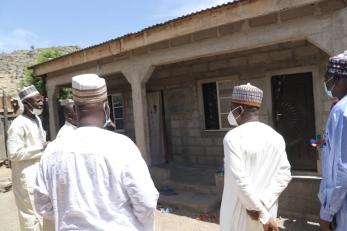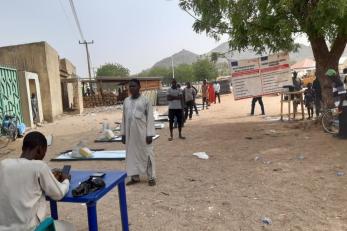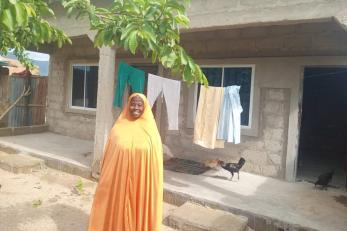Mercy Corps, EU hand over 325 permanent shelters to families in Gwoza, Borno state

Mercy Corps and the European Union (EU) on Thursday, November 5, handed over 325 permanent shelters to returnee families in Gwoza Local Government Area of Borno State, in the framework of the Borno ‘Maida’ – Early Recovery Program (MAIDA), which target victims of the insurgency in the state. The construction of the shelters is part of efforts to provide social protection for the conflict-affected families who have returned to their communities to rebuild and restart their lives under the EU-funded Borno ‘Maida’ – Early Recovery Program, implemented in Borno State by Mercy Corps and the International Centre for Energy, Environment and Development (ICEED).
Mercy Corps conducted an assessment in November 2018 and mapped out about 1,916 displaced families in urgent need of shelter in Gwoza. After further assessment, 325 most-in-need families were selected for immediate assistance. Majority had their homes razed to the ground or completely damaged, and lost their livelihoods to insurgency attacks, which had many living in makeshift shelters. After 11 months’ work of assessing the community needs, prototyping a suitable shelter and construction work, 325 of the most vulnerable returnee households, Internally Displaced Persons (IDPs) and host community members received a two room shelter inclusive of a veranda.
“Through the construction of these shelters, the MAIDA program has played its part in trying to build a sustainable construction industry in Gwoza in the medium to long term. In delivering this objective, we saw the community leadership taking a lead from sourcing materials to design to modification. Positive economic impact was experienced where materials were sourced locally, the social impact was seen where the artisans were being engaged and empowered by taking part in the actual construction and by helping them put some kind of structure to their businesses,” said Ndubisi Anyanwu, Country Director for Mercy Corps Nigeria.

“We acknowledge and sincerely thank our donors, the European Union. This story would not have happened without your vision, foresight and action. We appreciate the support of the Borno State Government through the Ministry of Reconstruction, Rehabilitation and Resettlement (MRRR), who were instrumental in seeing that the community shelter design needs were met. Also, the International Centre for Energy, Environment & Development (ICEED), our program partner, who provided solar home systems and electrical wiring/installations for the shelters,” said Anyanwu.
“Mercy Corps Nigeria is going beyond emergency response and survival to a more sustainable approach through resilience. We would also like to sincerely thank the traditional rulers and the local government leaders and officials for their unalloyed support and collaboration; we thank them for accepting us and for working with us to create this success story,” he added.
Families who had lost their homes to insurgency attacks, living in makeshift shelters and squatting with relatives can now live an assured life in their own homes, free of threats from harsh weather, forceful eviction and overburdening their relatives.

“My fear of forceful eviction is gone forever. I now have my own shelter to live happily with my family. Thank you very much Mercy Corps. May God reward you," said Aboko.
With the crisis entering its 12th year, the European Union is leading efforts to support the needs of the people affected by this protracted conflict and its impacts in Borno, Adamawa and Yobe States. The EU recognizes the need to go beyond lifesaving humanitarian assistance and start early recovery activities where possible, and to strengthen the resilience of the most vulnerable.
To this end the European Union has allocated more than 500 million euros to the Humanitarian, Development and Peace Nexus in Borno State for programs that will support lifesaving humanitarian assistance, peace and reconciliation, recovery of livelihoods and basic services, whilst building social cohesion and strengthening delivery by the government authorities. This approach is in line with the EU's integrated approach to conflicts and protracted crises, which seeks to build on humanitarian interventions and to ensure coherence between all political, security, development and humanitarian instruments,” said Montse Pantaleoni, European Union External Action Service.
“I, Muhammadu Waziri, the Waziri of Gwoza, on behalf of the His Royal Highness and the entire people of Gwoza really appreciate the construction of 325 permanent shelters for the most vulnerable returnees, IDPs and host community members in Gwoza. Mercy Corps is addressing immediate needs of vulnerable communities and with their good approaches in conflict resolutions. With this series of achievements, we are all convinced and agreed beyond double doubt that Mercy Corps is a leading global organization in the world. You call it Mercy Corps but we call and address it as Mercy to the people and for the people,” said the Waziri of Gwoza, Mohammed Waziri, during the handover ceremony.
About the EU MAIDA program
Mercy Corps Nigeria, with funding by the European Union, is implementing the MAIDA program to support the early recovery of about 200,000 returnees, internally displaced persons and members of host communities affected by the violent insurgency in Borno State. Implemented in partnership with the International Centre for Energy, Environment & Development (ICEED), the program is implemented in accordance with the EU’s objective to build the resilience of conflict-affected people and communities in Borno in an environment-friendly way.
MAIDA also works with youth and adolescents to create opportunities for employment, giving them vocational training and helping them to diversify their income. The program also improves rural livelihoods through the provision of grants/input vouchers, establishing Village Saving Loans Associations (VSLAs), mobilizing and rehabilitating agriculture and livestock cooperatives and linking them to financial services. MAIDA also works to increase access to protection services for vulnerable populations and building social cohesion for conflict-affected communities. The program supports vulnerable households by disbursing cash transfers, providing energy efficient shelter, and promoting nutritional and hygiene knowledge. In partnership with ICEED, we provide fuel-efficient wood stoves which reduces time spent seeking firewood by women and girls.